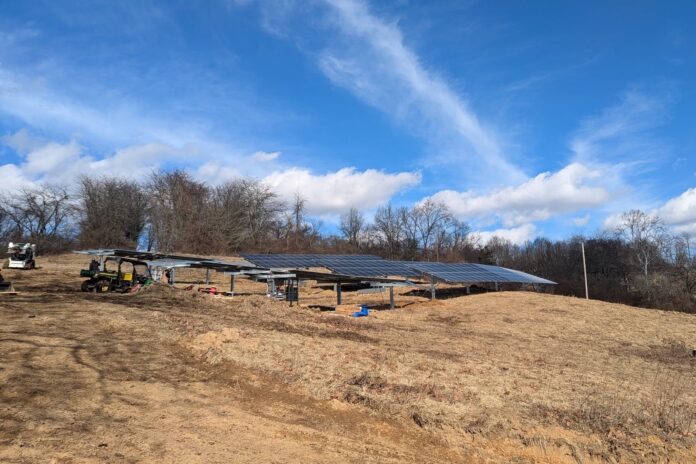
FRESNO, Ohio — Last April, Wooly Pig Farm Brewery received $143,000 through the Rural Energy for America Program to purchase and install a 99.91-kilowatt ground-mounted solar array — enough electricity to power nine homes — enabling owners Jael Malenke and Kevin Ely to make beer using the power of sunlight.
The electricity generated by the solar array offsets about 68% of the brewery’s annual energy consumption and is expected to save $14,373 in annual energy costs, reducing expenses for the popular business. In another time, this story might have ended here.
The grant, administered by the U.S. Department of Agriculture, was frozen indefinitely after a Jan. 27 memo from the White House Office of Management and Budget was issued to federal agencies instructing them to review programs and ensure they were following the president’s guidelines, pausing “financial assistance for foreign aid, nongovernmental organizations, DEI (diversity, equity and inclusion) woke gender ideology and the green new deal.”
With their grant amounting to half of the cost of the project, the Malenkes were left wondering if they would ever be reimbursed what they were promised.
They got something of an answer on March 25, when the USDA announced that previously obligated funding under the REAP program would be released, with a few caveats: Recipients now have 30 days to review and voluntarily revise their project plans to align with President Donald Trump’s priorities.
As laid out in his Jan. 20 Executive Order “Unleashing American Energy,” among other things, the administration is canceling previous investments and executive actions aimed at fighting climate change, including efforts to cut greenhouse gas emissions and promote renewable energy.
“This process gives rural electric providers and small businesses the opportunity to refocus their projects on expanding American energy production while eliminating Biden-era DEIA (diversity, equity, inclusion and accessibility) and climate mandates embedded in previous proposals,” reads the USDA press release about the REAP funds being restored.
According to the release, grant awardees will be asked to write a short narrative description of proposed changes, and they’ll have to answer several questions.
For Malenke, the news hasn’t exactly made things any clearer.
“We don’t know what the questions are at this point, and we don’t know how or what that means for a project like ours, which is completed,” she said. “We can’t change anything at this point that actually involves the project, the expense of it.”
The USDA did not immediately respond to questions, including whether all previously approved projects would receive funding, what happens to projects that do not voluntarily revise their plans and what criteria will be used to evaluate proposed changes.
At the time of writing, Malenke hadn’t received word from anyone at USDA about next steps. For now, she said she’s holding out hope.
“I don’t know what to say. It raised a lot of questions for us. We are hopeful that it does mean things are moving forward,” she said. “But I don’t know. I don’t know.”
“A pathway to insolvency”
Wooly Pig is far from alone. The freeze on REAP grants is just one piece of a larger funding crisis now affecting rural businesses and agricultural initiatives nationwide, prompting outcry from producers and leaders who warn of dire consequences for farmers and food systems.
Lindsey Shapiro, Farm Bill Campaign Organizer for the Pennsylvania-based farmer-member organization Pasa Sustainable Agriculture, stated on a coalition call hosted by grassroots organization ReImagining Appalachia on March 25 that the funding freeze has put many farmers in jeopardy, forcing them to navigate sudden and unexpected market shifts.
The stalled funding has particularly impacted farmers who had integrated programs like the USDA’s Local Food Purchase Assistance Cooperative Agreement Program and Local Food for Schools Cooperative Agreement Program into their operational planning. Many had already committed resources such as seed purchases, field planning and labor investments based on expectations that these contracts would be honored. Now, they face an uncertain path forward.
“A lot of farmers that were counting on those contracts for this upcoming growing season are all of a sudden in a place where they have to figure out new markets for things that they have already committed to producing,” Shapiro said.
For Pasa and its network of farmers, the consequences of the funding lapse extend beyond lost sales and disrupted planning. Hanging in the balance for Pasa is a frozen $55 million Partnerships for Climate-Smart Commodities grant that directly funded practices on farms in Pasa’s network that help producers adapt to climate change while reducing their environmental impact such as improving soil health, conserving water and cutting greenhouse gas emissions. Despite the pause on reimbursements, Shapiro said the organization must continue to fulfill the grant’s deliverables or risk breaching their contract with the USDA, amounting to a sort of race to the bottom.
“It’s kind of a pathway to insolvency,” Shapiro said. “So we’re not getting any reimbursements, any funding from the grant, but we’re being asked to continue to do the work that we were promised to do under the terms of the agreement.”
The situation has left many organizations, including Pasa, struggling to maintain operations. Having furloughed 65 of its 80 employees due to the halting of federal grants, Pasa is now participating in a lawsuit alongside the Southern Environmental Law Center and Public Rights Project to restore the flow of funding.
At a virtual town hall on March 26, Hannah Smith-Brubaker, Pasa’s executive director, addressed the challenges they now face.
“Pasa, at its heart, is a farmer-led organization,” Brubaker said. “We provide education, including several registered apprenticeship programs, outreach in the field for farmers, some on-farm research, policy work and most recently, technical support.”
Brubaker detailed Pasa’s history with the USDA and its shift in focus under previous leadership. She expressed frustration with the sudden halt of funds and emphasized the importance of diversified farms in stabilizing food systems.
The Climate-Smart Commodities grant, she explained, was initially championed by the USDA when it was introduced in 2022. At the time, she said the department had shown a renewed commitment to helping farmers who had indicated in surveys that climate change was affecting their work. Organizations such as Pasa, she said, were asked to leverage their trust with producers and encourage them to take advantage of the funding.
And now?
“With the current administration, understandably, we knew that with different priorities, things might change to some degree, but we did not anticipate that programs and funding would be completely frozen in the meantime,” she said. “And so we find ourselves in a situation where this program that really spoke to the needs of farmers is frozen, and that means that funding coming to Pasa is frozen and therefore we can’t pass that money along to farmers.”
Helping a little less
For Ebony Lunsford-Evans, an urban farmer in Pittsburgh and Pasa member, it’s personal. When plans to install a long-needed waterline at her business, Farmer Girl Eb LLC — eliminating her reliance on the local fire department to provide water for irrigation — fell through along with the Climate Smart Commodities funds, it felt like a crushing setback.
“We were super excited this year to find out that we wouldn’t need the fire department anymore and that we were going to be able to have a waterline established inside of our garden,” she said on the conference call.
That is, until she received an email from her program contact informing her that the Climate-Smart program had been halted by the new administration.
“It was a really sad disappointment,” she said. “I cried a little bit. I was mad. I was heated. I’m like, ‘This can’t be possible. Like, this has never happened.’”
Other farmers found their projects similarly derailed. Robert Dunning of Raspberry Ridge Creamery in Northampton County, Pennsylvania, said the freeze meant abandoning plans to extend grazing areas for his sheep.
“We were moving forward. We were scheduled to have the fence put up in March,” Dunning said. “And, of course, we were notified by Pasa that the grants were on hold and that, ultimately, this grant was not going to be realized for several reasons, which I don’t fully understand.”
Consultants, he said, who were responsible for conducting environmental analyses were apparently laid off; his grant depended on those evaluations.
“We go on. We live life,” Dunning said.
Like many affected farmers, he had to pivot.
“We actually purchased a reduced version of our fence and had it installed. Those funds were moved from a different project, which was going to increase our milking system,” he said. “So we’re not going to be able to experience the growth in revenue that we had hoped.”
Beyond the Climate-Smart freeze, Dunning also highlighted how his business has been affected by the cancellation of the Local Food Purchase Assistance program, which had allowed his creamery to sell products to a food bank.
“One of the hard things about this uncertainty is that it takes years to develop the infrastructure for a farm,” Dunning said. “We made plans. Fortunately, we didn’t make certain investments, for example, for labels for products that we’re not going to be selling. But we have been affected in a couple of ways from the shrinking and cancellation of grants.”
As Pasa and other organizations push for legislative action, those impacted by the freeze are left in limbo, unsure of when or if relief will come.
“We do like to think that we’re helping the world by being small farmers,” Dunning said. “But (now) we’ll just be a little bit smaller. Maybe help a little bit less.”










